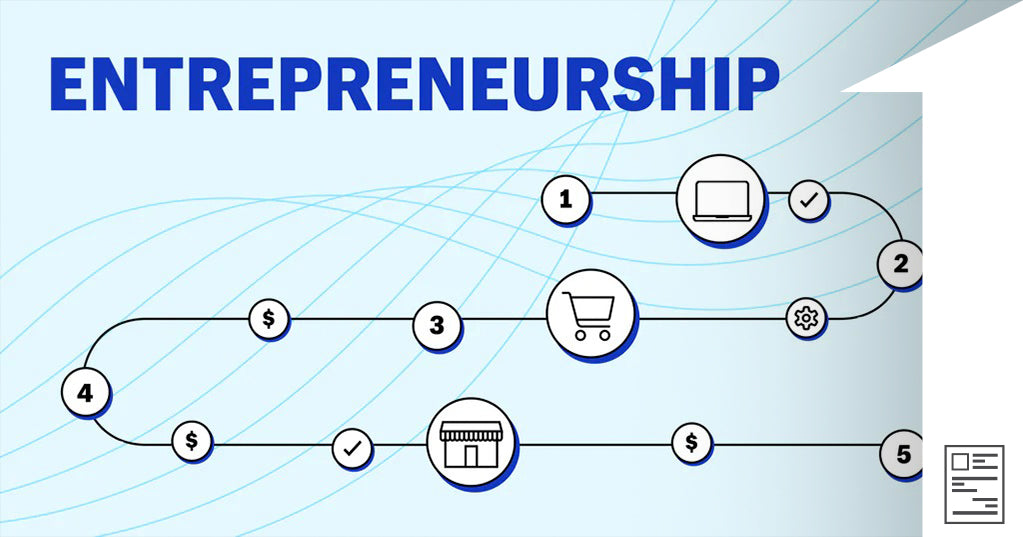From low-cost tools for marketing and design, to website and ecommerce solutions, to crowdfunding platforms, there have never been more resources for people interested in starting a new business venture. Perhaps that's why there are over 31 million entrepreneurs in the United States alone.
Entrepreneurship isn't simply about being self-employed or having a great business idea. In this article, we'll define entrepreneurship and discuss what it takes to become a successful entrepreneur in today's world.
What is entrepreneurship?
Essentially, entrepreneurship is the process of developing, organizing, and running a new business to generate profit while taking on financial risk. In a broader sense, entrepreneurship is the process of transforming the status quo by solving the most pressing problems and pain points in our society, often by introducing an innovative product or service or creating new markets.
Entrepreneurship is now a popular college major, with a focus on studying ideation, new venture creation, and profit driven models.
What is an entrepreneur?
An entrepreneur is someone who has an idea and who works to create a product or service that people will buy, as well as an organization to support that effort. An entrepreneur takes on most of the risk and initiative for their new business, and is often seen as a visionary or innovator.
Entrepreneurs come in all shapes and sizes, including small business owners, content creators, startup founders, and anyone who has the ambition to build a business and work for themselves.
Common traits for entrepreneurs
- Enjoy freedom and flexibility
- Are inventive
- Are goal orientated and ambitious
- Think creatively
- Are fearless
- Problem solvers
- High self initiative
- Understand basic finance principles
7 Types of entrepreneurs
Entrepreneurs are as diverse as they are dynamic. Here are seven different types of entrepreneurs.
- The Independent
- The Freedom Seeker
- The Creative
- The Opportunist
- The Hustler
- The Digital Nomad
- The Legacy
Pros and cons of entrepreneurship
While aspiring entrepreneurs have the potential to earn massive fame and fortune by starting a successful business, entrepreneurship is not without its hazards. Here are some of the pros and cons.
Pros of Entrepreneurship
- Work flexibility. Entrepreneurship means self employment, which comes with the ability to set your own schedule and work where you want.
- Ability to follow your passion. If your innovative idea is related to your passions or hobbies, entrepreneurship enables you to make a career out of what you love.
- Total control. Because they own their own businesses, entrepreneurs have complete control of their entrepreneurial ventures, with the ability to make decisions quickly.
- Creativity. Without the burdens of bureaucracy common in large, mature companies, entrepreneurs can solve problems creatively and experiment often.
- Unlimited earning potential. As famous entrepreneurs like Mark Zuckerberg or Bill Gates show, a startup entrepreneur with a successful business idea can make millions or even billions of dollars.
Cons of Entrepreneurship
- Financial risk. Becoming an entrepreneur means putting money on the line for your idea. If it doesn't work out, you'll be responsible for dealing with disappointed investors and outstanding bank loans.
- Long hours. Between brainstorming new ideas, wooing potential investors, and managing the day-to-day operations of their businesses, many entrepreneurs work long and hard to make their dream a reality.
- Greater responsibility. As the leader of your own business, everyone will be looking to you for vision and direction, which can cause tremendous personal stress.
- High competition. Just because your business idea is innovative doesn't mean you won't face stiff competition, whether from established firms in your industry or other entrepreneurs looking to beat you to the finish line.
- Unreliable income. While successful entrepreneurs may see a big payday, it won't happen overnight. In the meantime, expect lean times as you invest all of your income into growing your business.
What is the entrepreneurial mindset?
Becoming a successful entrepreneur starts with bringing an entrepreneurial mindset to your business venture. The entrepreneurial mindset a set of skills, beliefs, and thought processes entrepreneurs bring to the task of building a new business. The main elements of this mindset are:
- Curiosity. An effective entrepreneur questions everything, learns all they can, and is open to new and radical ideas, even if they contradict your most basic assumptions.
- Independence. There's no precise roadmap to success as an entrepreneur. Turning a new idea into a successful business requires risk taking and an ability to plan your next move without hand-holding from others.
- Resiliency. Succeeding as an entrepreneur means not only enduring pressure and failure, but also learning and growing from those experiences.
- Persuasiveness. To raise money and grow their team, an aspiring entrepreneur needs to be able to confidently sell their business idea to what is often a skeptical audience.
- Focus on helping others. Entrepreneurs create value by solving problems for the people around them. The best entrepreneurs are focused on creating a positive impact, rather than making money.
Common entrepreneurship requirements
Beginning a start-up as an aspiring entrepreneur generally requires:
- A business concept or idea involving a product, service, process, or new technology
- People to support the work, whether as employees, vendors, or advisors
- A process by which the product or service will be delivered, or the technology will be developed
- Enough funding to support the development of the idea to the point that it generates revenue
- A peer reviewed business plan
Why entrepreneurs start new businesses
According to research by Cox Business, the main reasons people engage in entrepreneurship and go out on their own, rather than staying employed, are:
- Control: to be their own boss
- Ambition: to start something from scratch themselves
- Profit: opportunity to earn more money
In fact, an Intelligent Office study reported that 65% of employees would rather be entrepreneurs than work for someone else.
Deciding what kind of business to start
Finding a need or opportunity in the market and filling it is at the core of entrepreneurship and small business success. That doesn't mean that starting a business similar to one already in existence can't be successful, however.
In considering what kind of business to start, assess:
- Your interests: are any of your passions, hobbies, or interests ripe for innovation?
- Your background and experiences: how has your personal history prepared you for the challenges of being an entrepreneur?
- Your financial resources: can you gather the necessary resources to get a given business idea off the ground?
- Unmet market needs: what business opportunities exist in your chosen industry or field?
- Problems you can solve: what challenges do your skills and knowledge prepare you to address in your external environment?
- Your network and connections: which people in your professional network can help you along in your entrepreneurship journey?
With an estimated 50% of new businesses failing in the first five years, entrepreneurs will also need to be committed, persistent, and adaptable to beat the odds.













